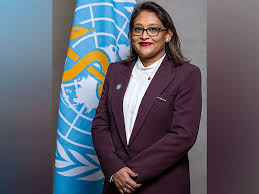
Investment in Mental Health Services Urged at International Conference
At the 23rd Annual International Mental Health Conference held in Bangkok, Thailand, Regional Director Saima Wazed delivered a compelling address on the critical importance of mental health for individual well-being and community development.
In her keynote speech, Wazed highlighted how mental health is fundamental to enabling individuals to realize their full potential, contribute meaningfully to their communities, and lead fulfilling lives. She pointed out that a robust mental health system is not only essential for individual health but also for the overall strength and resilience of communities.
Wazed emphasized the need for a substantial increase in investment at both community and primary healthcare levels. She argued that such investment is crucial for building responsive and effective mental health systems that can address the diverse needs of populations. “To create an environment where mental health services are accessible to everyone, we need to invest in the foundation of our healthcare systems,” Wazed said.
A significant part of her speech focused on strengthening human resources dedicated to mental health services. Wazed stressed that expanding the workforce in this field is vital to meet the growing demand for mental health support and to ensure that services are available across various settings. She also noted that training and supporting healthcare professionals are essential for improving the quality of care and expanding the reach of mental health services.
Wazed called attention to the importance of addressing the needs of vulnerable and marginalized groups, including those facing socioeconomic challenges, refugees, and individuals living in remote or underserved areas. She emphasized that these groups often face additional barriers to accessing mental health services and that targeted efforts are needed to ensure they are not excluded from receiving quality care.
“Ensuring that no one is left behind is a fundamental principle of equitable healthcare,” Wazed remarked. “We must focus on the most vulnerable populations to ensure that everyone has access to the mental health services they need.”
The conference brought together experts, policymakers, and advocates from around the world to discuss strategies for improving mental health systems globally. Wazed's address resonated with many attendees, sparking discussions on practical steps and policies that can be implemented to enhance mental health care.
The conference concluded with a call to action for governments, healthcare providers, and organizations to prioritize mental health in their policies and funding decisions. By adopting a comprehensive approach that includes increased investment, expanded workforce training, and targeted support for vulnerable groups, the global community can work towards a future where mental health services are accessible and effective for all individuals.
The discussions at the conference reflect a growing recognition of the importance of mental health as a critical component of overall health and well-being, highlighting the need for continued advocacy and investment in this vital area.